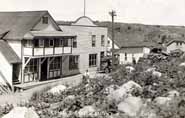In any small settlement, there are a couple of institutions that seem to embody life in the community. Sometimes the institution is the church or the school, and sometimes it is a store. In Creighton, the churches and the school were very important parts of life in the community, but Kelly's store was also an important part of the makeup of early Creighton.
 James C. Kelly opened his store at number 1, Mary Street in Creighton Mine on June 1, 1908. He was the first recorded merchant to locate in Creighton. There was a post office, located in a small frame building built by the Company, but this soon re-located to Kelly's store. From 1908 to 1940, J.C. Kelly offered personal service to the people of Creighton. At the time, the Canadian Copper Company (part of the International Nickel Company) owned all of the buildings in the town. The Company had to give permission for the store to open.
James C. Kelly opened his store at number 1, Mary Street in Creighton Mine on June 1, 1908. He was the first recorded merchant to locate in Creighton. There was a post office, located in a small frame building built by the Company, but this soon re-located to Kelly's store. From 1908 to 1940, J.C. Kelly offered personal service to the people of Creighton. At the time, the Canadian Copper Company (part of the International Nickel Company) owned all of the buildings in the town. The Company had to give permission for the store to open.
The first ore had been shipped from the mine in 1900. Supplies for the growing number of miners and boarding houses in Creighton were originally brought in on the Algoma Eastern Railway from Sudbury. Kelly obviously saw a chance to make some money by providing the miners with a place to buy work clothes and the boarding houses with a chance to see what they were buying without spending a whole day travelling to Sudbury and back. As more and more families settled in the growing town, Kelly's business also grew.
Mr. E. Cretzman Sr. arrived in Creighton with his parents in 1906. As soon as he was old enough to escape the supervision of Miss Black, the local teacher, he went to work at Kelly's. In a 1977 interview, Mr. Cretzman remembered the arrival of electric light to Creighton and the store. He said that it looked a little odd, seeing all the wire running on the surface of the walls and ceiling, but when the lights were turned on, it was almost a miracle. The Company owned the electric generators which powered the lights. Some residents remember that it cost $0.20 per month for each light.
It must have been a real challenge working in early stores in Creighton. Customers had to be served in their native language and Creighton was a multi-national community in those early years. One woman who worked in one of the early stores remembered that the girls had to speak English, Finn, and Ukrainian.
Mr. Cretzman remembered that the girls went around to the homes of the store's customers in the morning and evening, taking down orders. Later, groceries would be delivered by horse and wagon. Delivery was important especially when you consider that flour was often bought in 100 pound bags and very few families living in Creighton had their own horses, let alone a car. Today, the Walden-Nickel taxi company continues this tradition for seniors and shut-ins.
A receipt from Kelly's store, dated June 1913, shows a typical transaction. Mr. Johannus Lahti purchased 4 yards of cloth for $3.00, thread for $.40, snuff for $1.15, and soap for $1.00. His past account was $6.20. The total was $11.95. He paid by giving Kelly one bag of potatoes (probably 100 pounds) for $6.50, and $10.20 worth of butter at $.60 per pound. This gave him a credit of $4.75.
Kelly's store was just one of the stores in Creighton. Residents will not soon forget Fievoli's, Tony Carlo, Lando Vagnini, Jaworski's, Magill's, Fera's or any of the other stores that were so much a part of life in Creighton.
Material compiled from The Walden Observer and Greater Sudbury Heritage Museums Archives.

 Greater Sudbury Guestbook
Greater Sudbury Guestbook
 Home Page
Home Page
 Greater Sudbury Histories
Greater Sudbury Histories
 Kelly's Store
Kelly's Store



